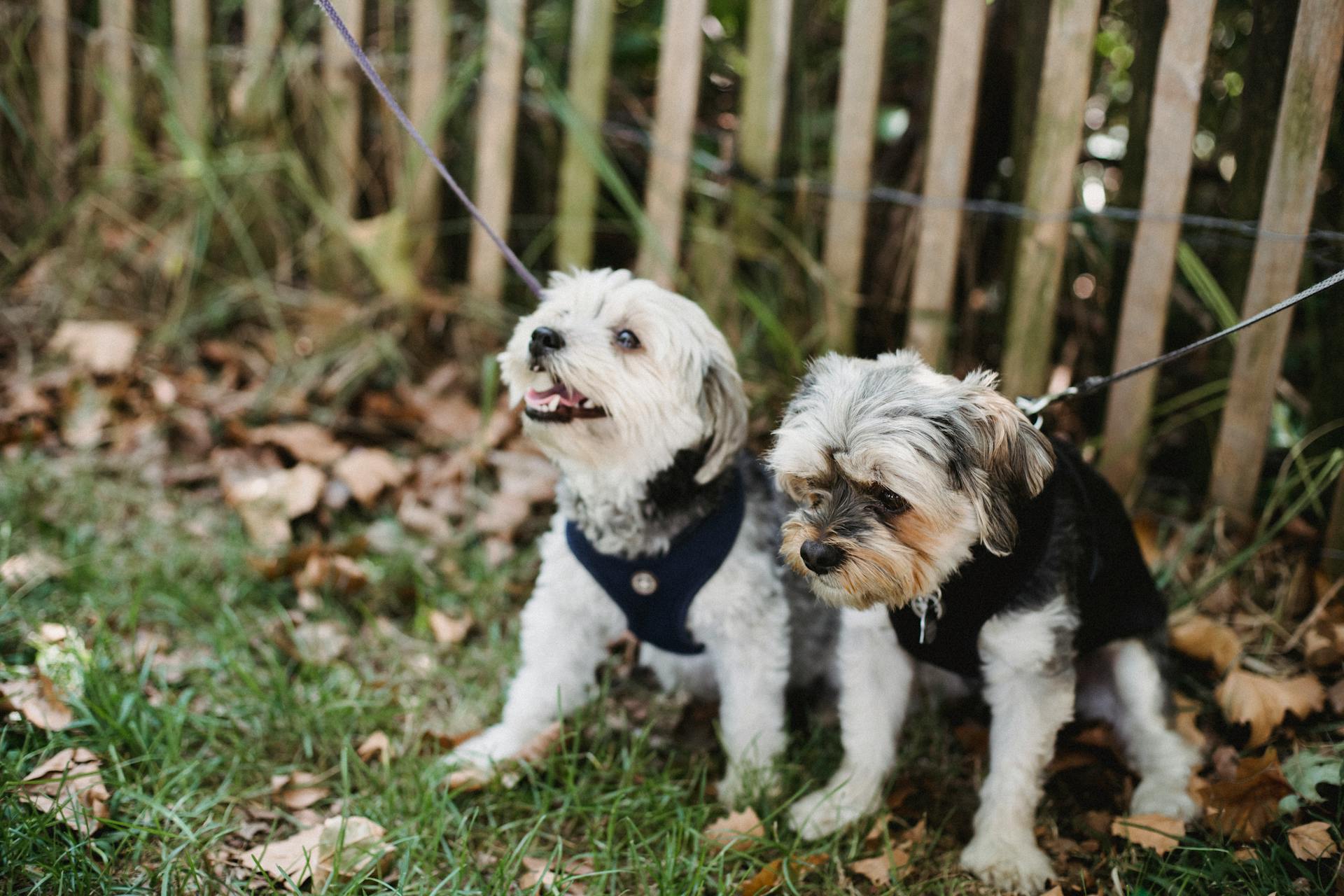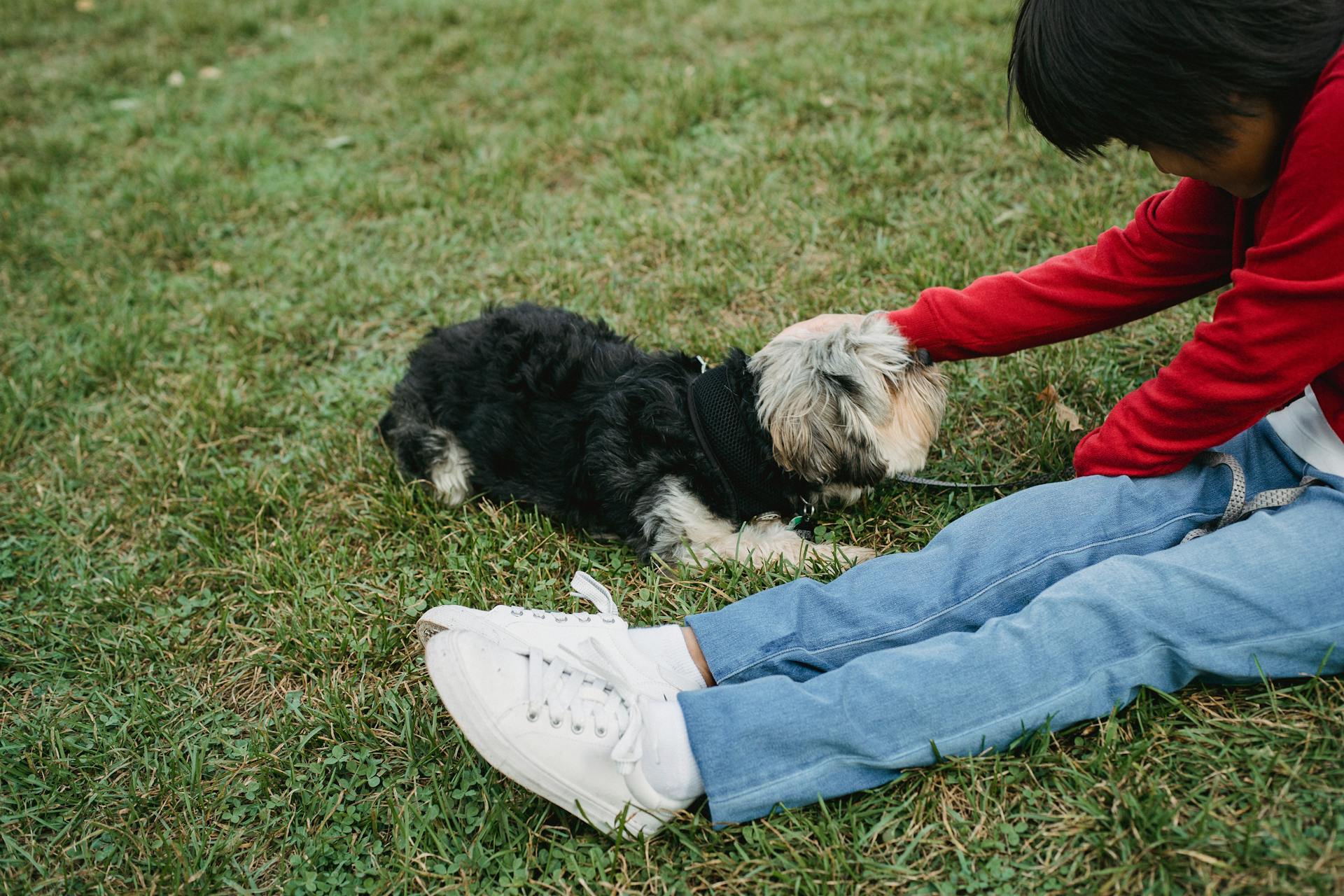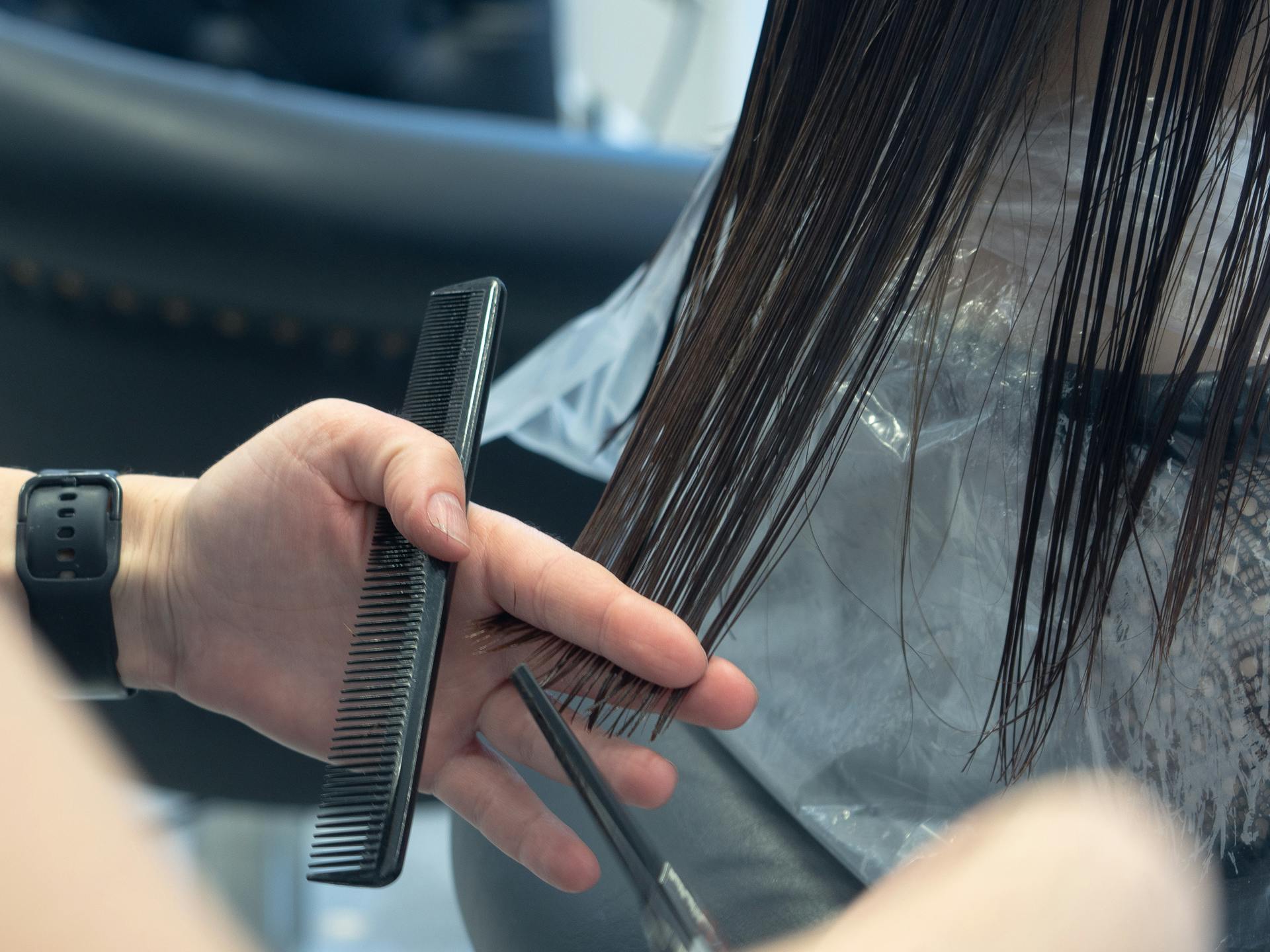
Yorkshire Terriers are tiny dogs with big personalities, and with the right care, they can live happy and healthy lives. They typically weigh between 7-15 pounds and stand 6-7 inches tall.
Yorkies are prone to dental issues, so regular dental care is crucial. This includes daily brushing and regular veterinary check-ups to prevent tartar buildup and gum disease.
Their coats require regular grooming to prevent matting and tangling. This includes daily brushing and regular trimming every 4-6 weeks.
Yorkies are energetic dogs that need regular exercise to stay happy and healthy. A daily walk and playtime should be a minimum, but they also love to run and play, so be prepared to get moving with your Yorkie!
On a similar theme: Australian Silky Terrier Yorkies
Health Issues
Yorkshire Terriers are a relatively healthy breed, but they can be prone to certain health issues. Their typical lifespan is 11-15 years, making regular veterinary care and preventative measures crucial.
Dental disease is a common condition in Yorkies, affecting 80% of all dogs by age two. It starts with tartar build-up on the teeth and progresses to infection of the gums and roots of the teeth, potentially leading to tooth and bone decay.
Explore further: English Bulldog Teeth
Preventing dental disease requires daily toothbrushing using a pet-specific toothpaste and regular dental cleanings under anesthesia. This can help prevent future buildup and reduce the risk of infection.
Yorkies are also susceptible to bacterial and viral infections, such as parvo, rabies, and distemper. These infections are often preventable through vaccination, which should be recommended by a veterinarian based on the dog's age and other factors.
In addition to dental and infectious diseases, Yorkies can also experience eye problems, such as cataracts and dry eye (keratoconjunctivitis sicca). Regular eye exams can help detect these conditions early on, and prompt treatment can prevent vision loss and pain.
Some common musculoskeletal problems in Yorkies include patellar luxation, Legg-Calve-Perthes disease, and intervertebral disc disease (IVDD). These conditions can often be diagnosed and treated with medication, surgery, or a combination of both.
Genetic Predispositions
Yorkshire Terriers are prone to certain health issues due to their genetic predispositions. They are more likely to develop dental disease, which affects 80% of all dogs by age two. This condition starts with tartar build-up on the teeth and progresses to infection of the gums and roots of the teeth, potentially leading to tooth loss and damage to other organs.
Explore further: Dogo Argentino Teeth
Regular dental cleanings and daily toothbrushing can help prevent dental disease. Your Yorkie's teeth should be cleaned regularly, and you'll be advised on how to keep them clean at home.
Yorkshire Terriers are also susceptible to bacterial and viral infections, such as parvo, rabies, and distemper. Vaccination can prevent many of these infections. The type and frequency of vaccination will depend on your dog's age, the diseases seen in your area, and other factors.
Some common eye problems in Yorkies include cataracts, which can cause blindness, and dry eye, also known as keratoconjunctivitis sicca. This condition can be painful and requires treatment with ointment.
Yorkshire Terriers may also be prone to bone and joint problems, such as patellar luxation, where the kneecap slips out of place, and Legg-Calve-Perthes disease, a degenerative hip condition that requires surgery. Intervertebral disc disease (IVDD) is another common condition that can cause paralysis and requires prompt treatment.
Retained puppy teeth are common in small breeds like Yorkshire Terriers. These teeth can crowd the incoming adult teeth, causing cavities and infections if not removed.
Here are some common genetic predispositions in Yorkshire Terriers:
- Dental disease
- Bacterial and viral infections
- Cataracts
- Dry eye (keratoconjunctivitis sicca)
- Patellar luxation
- Legg-Calve-Perthes disease
- Intervertebral disc disease (IVDD)
- Retained puppy teeth
Eye
Eye health is crucial for your Yorkshire Terrier, and there are several issues to be aware of.
Yorkies can develop tear stains at the corners of their eyes, which can be prevented by wiping their eyes with a wet cloth or using an eye cleaning solution. Daily use of an eye cleaning solution like Angels' Eyes can also help.
Keeping your Yorkie's hair around the eyes short or pulled back is essential to prevent it from irritating their eyes or obscuring their vision.
Cataracts are a common cause of blindness in older Yorkies, and they can be identified by an opaque lens that looks cloudy instead of clear. Surgery to remove cataracts and restore sight may be an option.
Dry eye, also known as keratoconjunctivitis sicca or KCS, is a painful condition that can cause sore, itchy eyes and infections. Symptoms include a dull, dry appearance or thick discharge from the eyes, squinting, and pawing at the eyes.
Here are some common eye problems in Yorkies:
- Cataracts: a common cause of blindness in older Yorkies
- Dry eye (KCS): a painful condition that can cause sore, itchy eyes and infections
Allergies
Allergies can be a real challenge for Yorkies, making their skin itchy and uncomfortable.
In dogs, allergies make their skin itchy, rather than sneezing like humans do. This skin allergy is called atopy, and Yorkies often have it.
The feet, belly, folds of the skin, and ears are most commonly affected areas.
Symptoms typically start between the ages of one and three and can get worse every year. This means that if you notice any issues, it's essential to address them early on to prevent further complications.
Licking the paws, rubbing the face, and frequent ear infections are common signs of allergies in Yorkies. These symptoms can be frustrating for both you and your furry friend.
The good news is that there are many treatment options available for these conditions, so don't lose hope!
Check this out: Yorkshire Terrier Skin Bumps
Retained Puppy Teeth
Dogs normally begin to lose their primary ("puppy") teeth at around 4 months of age.
Retained puppy teeth can crowd the incoming adult teeth and trap food and hair between the teeth, causing cavities and infections.
Painful gums, bad breath, and adult tooth loss can result if retained puppy teeth are left untreated.
Retained teeth are common in small breeds like Yorkshire Terriers.
We'll monitor your pet's growing teeth at each exam and discuss removal of any retained puppy teeth with you when indicated.
Expand your knowledge: Yorkshire Terrier Teeth
Tracheal Collapse
Yorkshire Terriers are prone to tracheal collapse, a condition where the trachea, or windpipe, becomes too narrow and can lead to coughing or difficulty breathing.
The trachea is made up of rings of cartilage that provide flexibility and strength, but in Yorkies, these cartilage rings can be weak or incorrectly formed.
This weakness can cause the trachea to collapse, leading to breathing difficulties and coughing.
Most cases of tracheal collapse in Yorkies are mild and can be treated with medication.
However, in severe cases, surgery may be recommended to alleviate symptoms.
Yorkies' tracheal collapse is often caused by their small size and delicate cartilage rings.
Yorkies typically live a long life, 11-15 years, but tracheal collapse can be a serious issue that affects their quality of life.
Tracheal collapse can be a recurring problem for Yorkies, requiring ongoing treatment and care.
Yorkie owners should be aware of the signs of tracheal collapse, such as coughing and difficulty breathing, and seek veterinary care if they suspect their dog is affected.
Expand your knowledge: Yorkshire Terrier Coughing
Home Health
Taking care of your Yorkshire Terrier's health at home is a crucial part of being a responsible pet owner.
Watch her diet closely, as it's essential for her overall health and well-being. Make sure she gets plenty of exercise, as this will help her stay happy and healthy.
Regularly brush her teeth and coat to prevent any potential health issues. This simple habit can go a long way in keeping your dog's health on track.
Call us or a pet emergency hospital if something seems unusual, as prompt action can make all the difference in your dog's health. Don't hesitate to reach out if you notice any changes in her behavior or physical condition.
Adhere to the schedule of examinations and vaccinations that we recommend for her, as these check-ups are vital for detecting any potential health issues early on. This will also give us the opportunity to test for diseases and conditions that are common in Yorkies.
Signing up for pet health insurance is a very important step in caring for your pet, as it will help you cover the costs of medical tests and procedures she may need throughout her life.
Explore further: Will Shiba Inu Ever Reach 1 Cent
Nutrition
Yorkshire Terriers require a balanced diet to stay healthy, and their nutritional needs change as they grow from puppies to adults. AAFCO-approved dog food is a great place to start, but your veterinarian may recommend supplements depending on your dog's specific health needs.
For Yorkies, omega-3 fatty acids (DHA/EPA) can be beneficial, acting as natural anti-inflammatories that support the skin, coat, kidneys, joints, and heart.
To ensure your Yorkie receives all the necessary nutrients, feed them a commercial kibble or wet food that's approved by the Association of American Feed Control Officials (AAFCO). This will guarantee a complete and balanced diet.
Here's a quick guide to help you determine the right amount of food for your Yorkie:
Remember to talk to your veterinarian to calculate your dog's caloric needs, and always follow the feeding guide labels on dog food.
In This Article
Yorkshire Terriers have specific nutritional needs that are crucial for their overall health and well-being. They are prone to health conditions such as liver shunts and hypoglycemia, which can be managed with proper nutrition and regular veterinary check-ups.

To determine the right caloric intake for your Yorkie, it's essential to consult with your veterinarian, who can calculate your dog's caloric needs based on their physical size, metabolism, neuter status, and activity level.
Yorkies need a high-quality diet that's appropriate for their age, and it's best to avoid giving them people food, as this can lead to nutritional imbalances and other health issues.
Feeding a Yorkie can be a bit tricky, but here are some general guidelines to keep in mind:
By following these guidelines and working closely with your veterinarian, you can help ensure that your Yorkie receives the nutrition they need to thrive.
Nutritional Tips
Yorkshire Terriers have specific nutritional needs that are crucial for their overall health and well-being. A well-balanced diet is essential for maintaining their skin, coat, and joints.
A good starting point is to feed your Yorkie a commercial kibble or wet food approved by the AAFCO. This ensures they receive a complete and balanced diet.
Check this out: What Can Yorkshire Terriers Eat
Yorkie puppies require a diet formulated specifically for puppies or designated for “all life stages.” This helps support their growth and development.
Adult Yorkies do well with two to three feedings per day, while puppies should eat three to four small meals per day to maintain their blood sugar.
To determine your dog's caloric needs, consult with your veterinarian, who can calculate your Yorkshire Terrier's caloric needs based on their physical size, metabolism, neuter status, and activity level.
Here's a rough guide to keep in mind:
Remember, treats should never make up more than 10% of a dog's daily calories, so offer them mindfully to avoid overfeeding.
Behavior and Training
Yorkshire Terriers are known for their big personalities, which can sometimes get the best of them - they're excessive barkers, after all.
To keep your Yorkie quiet, you'll need to teach them some manners, but the good news is they're easy partners for apartment living as long as they get enough mental stimulation and playtime.
They're curious and confident companions, making them great friends to have around.
Training a Yorkie can be a bit of a challenge, however, as they're not always easy to train and can be willful.
Discover more: Are Maltese Dogs Easy to Train
Behavior
Yorkshire Terriers have a big personality that can sometimes get the better of them. They think of themselves as much larger than they are and can be excessive barkers.
Teaching them to be quiet is a must, especially if you live in an apartment. Yorkies need a lot of mental stimulation and playtime to keep them happy and well-behaved.
For the most part, Yorkies are curious and confident companions. They make great partners if you're willing to give them the attention and exercise they need.
A different take: How Much Exercise Does a Yorkshire Terrier Need
Behavior Tips
Yorkies are notorious for being excessive barkers due to their oversized personality, so it's essential to teach them to be quiet.
Training a Yorkie can be a challenge, but it's most successful when based on positive reinforcement with praise and tasty treats.
Keep training sessions short and fun to keep your Yorkie pup engaged. This will help prevent boredom and frustration.
Socialization is key for Yorkie puppies, starting from the moment you bring them home. This will help your dog be the friendliest and most confident they can be when out in the world.
Yorkies are naturally brave and bossy, but they're also affectionate with family and strangers alike.
For your interest: When Is a Yorkshire Terrier Full Grown
Spay or Neuter
Spaying or neutering your Yorkie is one of the best things you can do for her.
Spaying or neutering decreases the likelihood of certain types of cancers and eliminates the possibility of your pet becoming pregnant or fathering unwanted puppies.
While your pet is under anesthesia, we can also identify and address some of the diseases she's likely to develop, such as hip problems or dental issues.
This is a great opportunity to address any underlying health concerns, making the surgery a more convenient and easier experience for both you and your pet.
Routine blood testing prior to surgery also helps us identify and take precautions against common problems that increase anesthetic or surgical risk.
For more insights, see: Japanese Chin Dog Health Problems
At Home
Yorkie training can be a challenge due to their willful nature. They are not especially food-motivated, which can make training more difficult.
To train a Yorkie successfully, focus on positive reinforcement with praise and tasty treats. Keep sessions short and fun to keep your Yorkie engaged.
Yorkie puppies need to be socialized from the moment you bring them home to help them be the friendliest and most confident they can be when out in the world.
To keep your Yorkie happy and healthy at home, watch her diet and make sure she gets plenty of exercise. Regularly brush her teeth and coat to prevent health issues.
If something seems unusual with your Yorkie, call us or a pet emergency hospital right away. Adhere to the schedule of examinations and vaccinations that we recommend for her.
Signing up for pet health insurance is another very important step in caring for your pet. This will help you cover the costs of medical tests and procedures she will need throughout her life.
Broaden your view: German Shorthaired Pointer Free to Good Home
Grooming and Hygiene
Yorkshire Terriers require regular grooming to stay healthy and happy. They have a long, silky coat that needs to be brushed daily to prevent tangles and knots.
Bathing your Yorkie too frequently can strip their skin of its natural oils, so it's best to limit baths to every two weeks. You can use a moisturizing shampoo to help prevent dry, flaky skin.
Yorkies are prone to blocked pores, which can cause bumps and inflammation. Special shampoos containing benzoyl peroxide can help flush out their pores.
Regular ear care is also essential for Yorkies. Check their ears weekly and clean them if they're dirty to prevent ear infections. If you notice any signs of infection, schedule a vet visit right away.
On a similar theme: Yorkshire Terrier Dry Skin
Grooming Guide
Yorkshire Terriers have a long, silky coat that requires regular grooming to prevent tangles and knots.
Daily brushing is necessary if your Yorkie has a full-length coat, but once-a-week brushing is usually enough if the coat is in a short puppy cut.
A small pin brush, like the Kenchii Oval Metal Pin Brush, is a great tool for keeping your Yorkie's coat healthy and looking its best.
Professional grooming is recommended every six to eight weeks to maintain a healthy and attractive coat.
Taking your Yorkie to the groomer regularly will help prevent matting and tangling, and keep their coat looking its best.
Curious to learn more? Check out: Healthy Bull Terrier
Skin
Yorkies can be prone to dry, flaky skin, so it's essential to use a moisturizing shampoo when bathing them.
Bathing your Yorkie too frequently can strip their skin of its natural oils, so it's recommended to bathe them no more than every two weeks.
To prevent blocked pores, which can cause bumps and inflammation, you can use special shampoos that contain ingredients like benzoyl peroxide.
Regular grooming and hygiene practices can help keep your Yorkie's skin healthy and looking its best.
Intriguing read: Allergic Reaction English Bulldog Skin Bumps
Ear
Taking care of your dog's ears is a crucial part of their overall health and hygiene. Checking your dog's ears weekly can help prevent ear infections.
Dirty ears can be a sign of an ear infection, so it's essential to keep an eye out for heavy debris or redness. If you notice either of these symptoms, schedule a vet visit right away.
Your veterinarian can recommend a suitable ear cleaner for your dog, so don't be afraid to ask.
Curious to learn more? Check out: Yorkshire Terrier Ear Infection
Pet Care Considerations

Yorkshire Terriers require regular grooming to prevent matting and tangling of their long, hair-like coats.
They need to be brushed frequently, even if you keep their coat cut short, to prevent dental disease and other health issues.
Yorkies don't tolerate cold weather well, so you may need to protect them with dog coats or stylish sweaters.
Their small size makes them prone to health conditions such as liver shunts and hypoglycemia, so research pet insurance plans before bringing a Yorkie home.
Daily tooth brushing is essential to delay dental disease in Yorkshire Terriers.
By keeping up with their grooming needs and providing regular veterinary care, you can enjoy a happy and healthy relationship with your Yorkie.
Suggestion: American Bully Coats
Parasites
Parasites are a serious concern for Yorkies, and it's essential to test for them on a regular basis. Hookworms, roundworms, heartworms, and whipworms can get into your dog's system in various ways, including drinking unclean water or walking on contaminated soil.
Fleas, ticks, and ear mites can infest your Yorkie's skin and ears, causing pain and discomfort. These parasites can also be transmitted to you or a family member, making it a serious concern for everyone.
Some parasites can cause even death in your canine friend, so it's crucial to take preventive measures. We'll recommend preventive medication as necessary to keep your Yorkie healthy.
Parasites can be transmitted through various means, including being bitten by an infected mosquito. This emphasizes the importance of regular testing and preventive measures to keep your Yorkie safe.
Office Calls
If you notice your pet is experiencing any of the following signs, it's time to schedule an office call with your veterinarian.
Changes in appetite or water consumption can be a sign of a larger issue, so keep an eye on your pet's eating habits.
Tartar build-up, bad breath, red gums, or broken teeth can be indicative of dental problems that need attention.
Itchy skin, hair loss, or excessive scratching, chewing, or licking can be a sign of skin allergies or irritations.
Lethargy, mental dullness, or excessive sleeping can be a warning sign that your pet is not feeling well.
Some pets may exhibit fearfulness, aggression, or other behavioral changes that warrant a veterinary visit.
Drinking and urinating more, eating more, and experiencing a potbelly or poor haircoat can be signs of underlying health issues.
Here are some common signs that may require an office call:
- Change in appetite or water consumption
- Tartar build-up, bad breath, red gums, or broken teeth
- Itchy skin (scratching, chewing, or licking); hair loss
- Lethargy, mental dullness, or excessive sleeping
- Fearfulness, aggression, or other behavioral changes
- Drinks and urinates more, eats more; potbelly, poor haircoat
- Slow or stunted growth; sometimes seizes after eating
- Increased hunger and thirst, weight loss
Common Problems
As a Yorkshire Terrier owner, it's essential to be aware of the common problems that can arise in your pet. Any abnormal symptom could be a sign of serious disease or it could just be a minor or temporary problem.
It's crucial to know when to seek veterinary help and how urgently. Many diseases cause dogs to have a characteristic combination of symptoms, which together can be a clear signal that your Yorkshire Terrier needs help.
Some common problems in Yorkshire Terriers include unusual combinations of symptoms that can indicate a serious disease. These symptoms can be a clear signal that your pet needs help.
It's not always easy to tell if your Yorkshire Terrier's symptoms are serious or not, so it's always better to err on the side of caution and seek veterinary help if you're unsure.
Related reading: Yorkshire Terrier Not Eating
Care and Maintenance
Yorkshire Terriers need regular grooming due to their long, hair-like coats that require frequent brushing.
They don't tolerate cold weather well, so you might need to protect them with dog coats or stylish sweaters. This is especially important if you live in a chilly climate.
Daily tooth brushing is crucial for Yorkies, as it will delay dental disease. This is a big deal, as their oral hygiene needs special attention.
Yorkies are prone to health conditions like liver shunts and hypoglycemia, so researching pet insurance plans is a must before bringing home a Yorkie puppy.
With regular grooming and healthcare, a Yorkshire Terrier can be a great choice for a family that's dedicated to keeping up with their dog's needs.
Emergency and Prevention
As a Yorkshire Terrier owner, it's essential to be aware of potential health issues that can arise. Scratching or shaking the head, tender ears, or ear discharge are all signs that require immediate veterinary attention.
If you notice your Yorkie straining to urinate or producing discolored urine, seek medical care right away. This could be a sign of a urinary tract infection.
Cloudiness, redness, itching, or any other abnormality involving the eyes can be a sign of an eye infection. Keep an eye out for these symptoms and schedule a vet visit if you notice anything unusual.
Coughing, exercise intolerance, rapid breathing at rest, leg stiffness, and reluctance to rise, sit, use stairs, run, or jump are all warning signs that your Yorkie may be experiencing respiratory distress. "Bunny hopping" is a common sign of hip dysplasia.
Here are some emergency signs to watch out for:
- Scratching or shaking the head, tender ears, or ear discharge
- Inability or straining to urinate; discolored urine
- Cloudiness, redness, itching, or any other abnormality involving the eyes
- Coughing, exercise intolerance, rapid breathing at rest
- Leg stiffness; reluctance to rise, sit, use stairs, run, or jump; “bunny hopping”
Frequently Asked Questions
Is a Yorkshire Terrier a good house dog?
Yes, Yorkshire Terriers are well-suited for indoor living due to their small size and low-shedding coat. They make excellent apartment dogs and pets for older people.
Sources
- https://www.petmd.com/dog/breeds/yorkshire-terrier
- https://www.lombardvet.com/services/dogs/breeds/yorkshire-terrier
- https://www.orchardroadanimalhospital.com/services/dogs/breeds/yorkshire-terrier
- https://www.7hillsvet.com/services/dogs/breeds/yorkshire-terrier
- https://www.pointvicentevet.com/services/dogs/breeds/yorkshire-terrier
Featured Images: pexels.com


